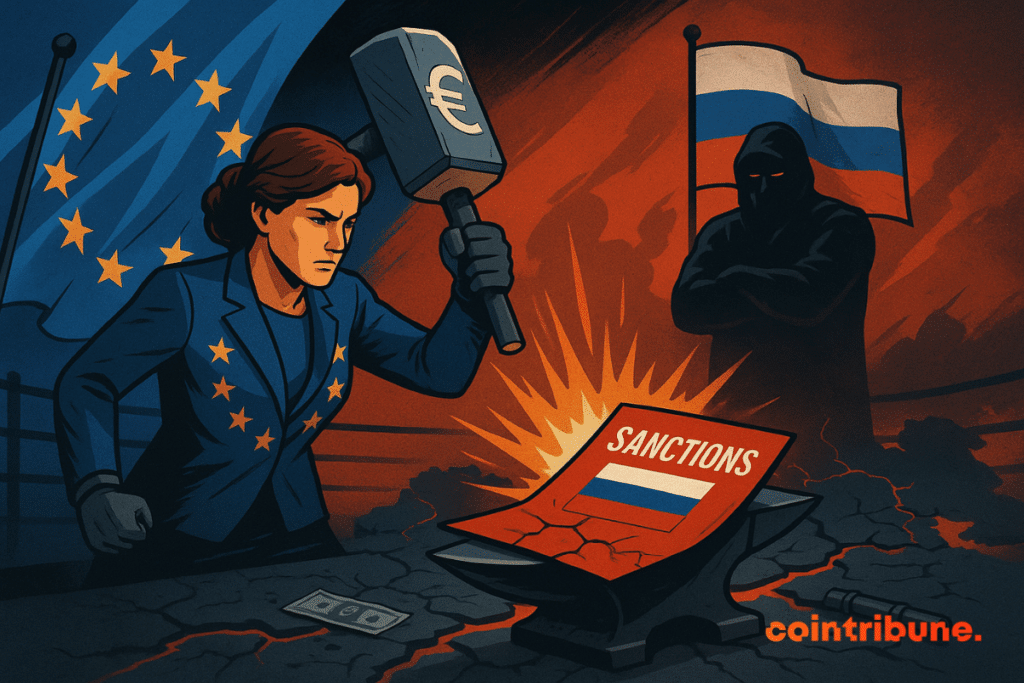The EU Strikes Russia Once Again With A New Package Of Sanctions
As the conflict in Ukraine drags on, the European Union is crossing a strategic threshold. On May 20, Brussels adopted a 17th package of sanctions targeting previously little-exposed targets: the Russian ghost fleet, a logistical pillar of oil circumvention. This maneuver, synchronized with London, marks a turning point in the economic war waged against Moscow. By toughening its stance, the EU aims to weaken the opaque networks financing the Russian military effort and maintain pressure on its foreign supporters.

In Brief
- The European Union has adopted a 17th package of sanctions against Russia, aimed at intensifying economic pressure on Moscow.
- This new wave specifically targets the Russian ghost fleet, a network of nearly 200 vessels used to circumvent restrictions on oil.
- Meanwhile, the United Kingdom has announced coordinated sanctions targeting finance, disinformation, and Russian military supply chains.
- This dual maritime and financial front could weaken Russia’s logistical and economic capabilities in the medium term.
Focus on the Ghost Fleet: A New Energy Front
In a statement made on the sidelines of a meeting of European Union defense ministers in Brussels, Kaja Kallas, head of European diplomacy, announced:
The EU has approved its 17th package of sanctions against Russia, targeting nearly 200 ships in its ghost fleet.
This decision reflects a strategic shift. After capping Russian oil prices, Brussels now intends to strike the circumvention mechanisms put in place by Moscow via vessels operating under flags of convenience, frequently changing identities or disabling their tracking systems.
Here are the main elements targeted by this new phase:
- Nearly 200 ships suspected of belonging to the Russian ghost fleet are listed among the sanctioned entities;
- These vessels are accused of masking the origin of Russian oil to resell it on Asian or African markets, circumventing Western restrictions;
- The EU’s goal is to further restrict the energy revenues that fuel Russia’s war effort;
- This strategy relies on better customs and maritime coordination within the Union to strengthen surveillance of undeclared export routes.
By targeting not only financial flows or energy companies but also the physical vectors of oil trade, the EU is refining its approach.
This development reflects an awareness. The economic resilience of Russia, an influential member of the BRICS, partly relies on opaque logistical networks, difficult to intercept without specific measures.
Thus, the political message is clear. Moscow will not be able to indefinitely exploit the leeway left by existing sanctions.
A Coordinated Offensive on Finance and Disinformation
Following the European Union, the United Kingdom also announced on Tuesday a new wave of measures aimed at hitting Moscow on other fronts. According to an official statement from the British Foreign Office, these sanctions this time concern the financial sector, military supply chains, and Russian disinformation outlets.
“The sanctions target financial institutions, individuals accused of spreading Russian disinformation, as well as supply chains for Russian lethal weapon systems, including Iskander missiles“, specified the Foreign Office.
This dimension, distinct from the European maritime approach, complements the suffocation strategy by targeting financing and production circuits.
Indeed, these new measures come amid heightened tensions following a massive drone attack on several Ukrainian regions the previous weekend.
Moreover, they reflect a political will to respond quickly to escalation while limiting the technological and financial maneuvering room of the Kremlin. In parallel, the British government stated that it is working with its international partners to strengthen the price cap mechanism on Russian oil, aiming to further reduce revenue from the Russian energy sector.
Maximize your Cointribune experience with our "Read to Earn" program! For every article you read, earn points and access exclusive rewards. Sign up now and start earning benefits.
Diplômé de Sciences Po Toulouse et titulaire d'une certification consultant blockchain délivrée par Alyra, j'ai rejoint l'aventure Cointribune en 2019. Convaincu du potentiel de la blockchain pour transformer de nombreux secteurs de l'économie, j'ai pris l'engagement de sensibiliser et d'informer le grand public sur cet écosystème en constante évolution. Mon objectif est de permettre à chacun de mieux comprendre la blockchain et de saisir les opportunités qu'elle offre. Je m'efforce chaque jour de fournir une analyse objective de l'actualité, de décrypter les tendances du marché, de relayer les dernières innovations technologiques et de mettre en perspective les enjeux économiques et sociétaux de cette révolution en marche.
The views, thoughts, and opinions expressed in this article belong solely to the author, and should not be taken as investment advice. Do your own research before taking any investment decisions.